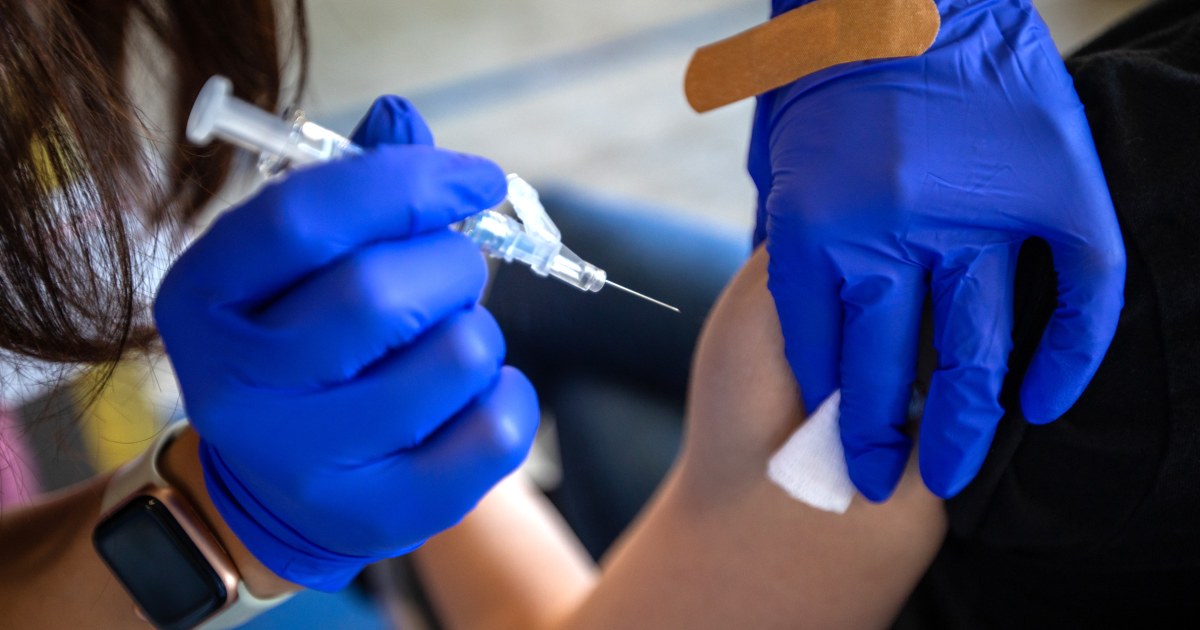COVID-19 and influenza vaccines can be safely administered at the same time, and, according to a recent study, doing so could even have benefits.
Results presented Monday at the Boston Vaccine Summit, an annual scientific conference, suggest that giving the coronavirus and common flu vaccines together could produce a more potent antibody response against COVID-19 than if one person You receive them separately.
The study measured the antibody levels of 42 workers of Massachusetts health who were vaccinated last fall. Twelve of the participants received a coronavirus vaccine booster and flu vaccine on the same day. Another 30 received the vaccines on different days within a month.
Three to four weeks after receiving COVID-19 boosters, those who had received the flu vaccine at the same time had higher levels of IgG1, an antibody involved in the body’s first line of defense against the coronavirus . The results were maintained six months later, suggesting that co-administration of the vaccines could improve long-term protection.
“We showed that the antibody response against COVID-19 was greater and longer lasting if the coronavirus and flu vaccines were administered on the same day,” says Susanna Barouch, lead author of the study and intern at the Serology Laboratory. of Systems at the Ragon Institute in Cambridge, Massachusetts.
The research is being peer-reviewed and has not yet been published in a scientific journal. Ryan McNamara, director of the lab and lead author of the study, said the results still need to be reproduced in a larger group of volunteers, but he thought it would be useful to share them immediately. The results were published on the BioRxiv website.
“We thought these results were very important for immediate public health decision-making,” McNamara said.
He added that he hopes the results will be applied to this year’s coronavirus vaccines, although his team plans to do more in-depth studies.
The Centers for Disease Control and Prevention (CDC) recommends receiving COVID-19 and flu vaccines at the same appointment if you are eligible for both vaccines at the same time. But that recommendation is based more on convenience than effectiveness, said Dr. Judith O’Donnell, chief of infectious diseases at Penn Presbyterian Medical Center in Phiiladelphia, who was not involved in the study.
“We would probably want to see this type of data replicated with the 2023 vaccines to know with 100% certainty whether giving them together could improve immunity or not,” he said.
How much immunity is healthy?
McNamara said it’s not clear why receiving both vaccines at the same time may result in stronger, longer-lasting protection.
One theory is that most people’s bodies are already prepared to produce antibodies against the coronavirus, because they have received the vaccine or have been exposed to the virus. According to McNamara, giving two vaccines at once could awaken this immune response to a greater extent than a single injection, which could lead to a more potent antibody response.
“The immune system is a highly tuned army and it’s basically calling in all the task forces at the same time,” said Dr. Michelle Barron, medical director of infection prevention and control at UCHealth Colorado, who was not involved in the research.
But that strong immune response could also induce greater side effects, he added. In a 2022 study, co-administration of the coronavirus booster vaccine and the flu vaccine was associated with an 8% to 11% higher rate of side effects such as fatigue, headache, and muscle pain in the week after vaccination, compared to administering the COVID-19 booster vaccine individually.
An October analysis by the Food and Drug Administration (FDA), which has not been peer-reviewed, also identified a slightly elevated risk of stroke among people over age 85 who had received a high dose of the vaccine. flu at the same time as the COVID-19 vaccine.
Dr. Scott Roberts, an infectious disease specialist at Yale Medicine, said it’s possible that “we’re starting to see such an acceleration of the immune system that we’re seeing inflammatory conditions like stroke in this select age group.”
But Barron noted that many older people have underlying health conditions that independently increase your risk of strokeand several other studies have not identified the same problem with co-administration of the coronavirus and flu vaccines.
“The benefit of getting vaccinated and knowing that you have that protection outweighs any of these potential risks,” he said.
Experts advise getting vaccinated now
The CDC recommends getting a flu vaccine in late October. However, as of Monday, fewer than 33% of American children and less than 35% of American adults had received a flu vaccine, according to CDC data.
Acceptance of COVID-19 vaccines is even lower this year: 5% of children and 14% of adults have received it.
O’Donnell said it’s reasonable that people might want to space out their vaccinations to reduce the risk of side effects. Although the CDC doesn’t recommend a set waiting period between vaccines, O’Donnell suggested people who prefer to space them out should space their shots a couple of weeks apart.
But infectious disease experts widely agreed that co-administration may be the best option at this time, since vaccines take two weeks to be fully effective and both the coronavirus and the flu are spreading in the United States.
COVID-19 hospitalizations fell 8% nationally in the week ending Nov. 4, but are increasing in many counties. Flu-related hospital admissions also increased 20% in that period, while the number of positive flu tests increased 50%.
“We have seen an increase in COVID-19 and now we are seeing an increase in flu”said Barron. “There’s really no use in saying, ‘I’ll wait another week,’ because it’s another week where whatever vaccine you didn’t get, you’re now potentially vulnerable.”

